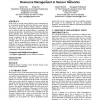Free Online Productivity Tools
i2Speak
i2Symbol
i2OCR
iTex2Img
iWeb2Print
iWeb2Shot
i2Type
iPdf2Split
iPdf2Merge
i2Bopomofo
i2Arabic
i2Style
i2Image
i2PDF
iLatex2Rtf
Sci2ools
118
click to vote
GECCO
2006
Springer
2006
Springer
Distributed genetic algorithm for energy-efficient resource management in sensor networks
In this work we consider energy-efficient resource management in an environment monitoring and hazard detection sensor network. Our goal is to allocate different detection methods to different sensor nodes in the way such that the required detection probability can be achieved while the network lifetime is maximized. The optimization algorithm is designed based on the Island multi-deme genetic algorithm (GA). The experimental results show that our algorithm increases the network lifetime by approximately 14.4% in average compared with the heuristic approaches. We also investigate the effect of the configuration parameters on the searching quality of the proposed distributed GA. A regression model is derived empirically that estimates the runtime of the distributed GA given the configuration parameters such as the subpopulation size, parallelism, and migration rate. Once the model has been fit to a group of data, it can be utilized to find the efficient configurations of the proposed a...
Related Content
| Added | 23 Aug 2010 |
| Updated | 23 Aug 2010 |
| Type | Conference |
| Year | 2006 |
| Where | GECCO |
| Authors | Qinru Qiu, Qing Wu, Daniel J. Burns, Douglas Holzhauer |
Comments (0)

